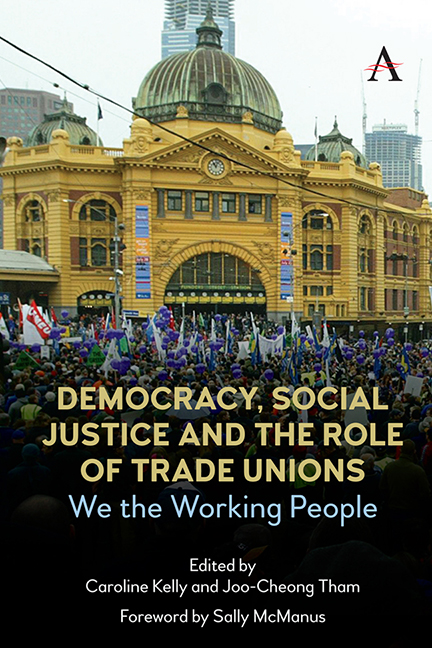Book contents
- Frontmatter
- Contents
- Foreword
- Acknowledgements
- Chapter 1 Democracy and Social Justice as Organising Principles
- Chapter 2 Economic Democracy, Workers and Unions
- Chapter 3 Nobody Owns the Future
- Chapter 4 Regulatory Approaches to the Internal Affairs of Trade Unions in Australia: From Democratic Control to Corporate Accountability
- Chapter 5 Trade Unions and the Regulation of Election Funding: Between Libertarianism and Egalitarianism
- Chapter 6 Trade Unions and Precarious Work: In Search of Effective Strategies
- Chapter 7 ‘Is There an App for That?’ Worker Representation, Unions and the Gig Economy
- Chapter 8 Temporary Migrant Workers and Trade Unions in Australia: A Complex Relationship
- Chapter 9 Unions, Fossil Fuel Exports and a Just Transition
- Chapter 10 Trade Agreements, Labour Rights and Democracy
- Chapter 11 Trade Unions, Labour Law and Democratic Socialism: The COVID-19 Crisis in the United Kingdom
- Notes on Contributors
- Index
Chapter 2 - Economic Democracy, Workers and Unions
Published online by Cambridge University Press: 18 November 2021
- Frontmatter
- Contents
- Foreword
- Acknowledgements
- Chapter 1 Democracy and Social Justice as Organising Principles
- Chapter 2 Economic Democracy, Workers and Unions
- Chapter 3 Nobody Owns the Future
- Chapter 4 Regulatory Approaches to the Internal Affairs of Trade Unions in Australia: From Democratic Control to Corporate Accountability
- Chapter 5 Trade Unions and the Regulation of Election Funding: Between Libertarianism and Egalitarianism
- Chapter 6 Trade Unions and Precarious Work: In Search of Effective Strategies
- Chapter 7 ‘Is There an App for That?’ Worker Representation, Unions and the Gig Economy
- Chapter 8 Temporary Migrant Workers and Trade Unions in Australia: A Complex Relationship
- Chapter 9 Unions, Fossil Fuel Exports and a Just Transition
- Chapter 10 Trade Agreements, Labour Rights and Democracy
- Chapter 11 Trade Unions, Labour Law and Democratic Socialism: The COVID-19 Crisis in the United Kingdom
- Notes on Contributors
- Index
Summary
This chapter compares democratic and shareholder decision-making models and looks at the role of unions in those. It discusses three ways of enhancing economic democracy at the point of production: to leave the formal decisionmaking power with those who hold it, but through countervailing force, require owners to take account of other interests in decision making; to change the formal decision-making process – that is, who makes the decisions; and to change the owners themselves – that is, by mobilising greater ownership by employees, or ownership by employees’ collectively owned funds. Unions are relevant, in varying ways, to all of these. The first corresponds to increasing workers’ associational power; the second to increasing their institutional power. Both of these are well-established concepts in the power resources literature regarding trade unions. The third concept is about increasing workers’ financial power. This is not so heavily discussed in the power resources literature, as it focuses on trade unions and so the concept of finance is typically tied to either the financial strength of a union or the effects of financialisation on unions. Here we are talking about a form of financial power that might be of the members rather than the unions themselves. However, unions are in reality closely linked to whether and how employees can have financial power. The chapter concludes with discussion of economic democracy, the future of the planet and the role of unions in that, including through active use of workers’ pension funds.
Types of Decision-Making Models
We can speak of two types of decision-making models: (1) the democratic model, in which everybody has a say of equal value, and (2) the shareholder model, in which people have influence in proportion to the resources they hold (and at times, those with low resources have zero say, while those with the most resources have all the say). Corporations are run on the shareholder model. A union meeting is closer to the democratic model. Elections are formally based on the democratic model. They are important, but most other aspects of politics reflect the shareholder model – that is, those with the most resources have the most say.
When we refer to economic democracy, we mean that the control of the resources that determine the form and effects of economic activity is distributed along democratic lines.
- Type
- Chapter
- Information
- Democracy, Social Justice and the Role of Trade UnionsWe the Working People, pp. 13 - 26Publisher: Anthem PressPrint publication year: 2021

